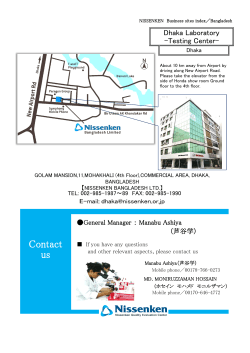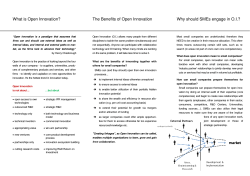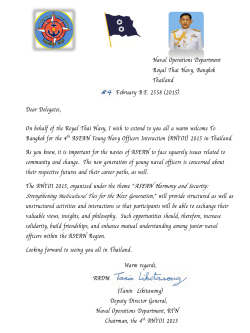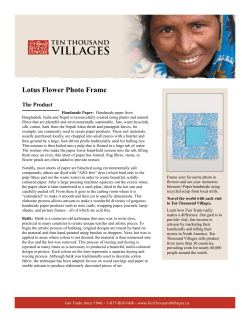
View PDF - The Asia Foundation
Regional Economic Cooperation in Asia Regional economic cooperation is an important means for creating new trade, investment and employment opportunities, enhancing economic security, and addressing broader socioeconomic and environmental issues. As Asia continues to experience major demographic shifts, a growing middle class and expanding domestic markets, more countries are recognizing that deeper integration can accelerate their collective economic growth and development. According to United Nations ESCAP, intraregional exports alone are expected to rise from $3.1 trillion to $6.8 trillion by 2016, fueled by the expansion of global and regional value chains and improved trade and transport connectivity. Yet significant challenges continue to hinder greater cooperation and integration. South Asia remains one of the least economically integrated regions in the world, while Southeast Asia is heading toward an ASEAN Economic Community (AEC) that holds great potential but poses a variety of challenges. The Asia Foundation is working across multiple dimensions to address these challenges to regional cooperation and facilitate a more connected and prosperous Asia-Pacific region. INNOVATIONS IN APPROACH Our activities incorporate evidence-based analysis and a political economy approach to policy reform, which allows us to achieve greater impact by mobilizing coalitions of engaged actors. This unique approach is made possible through our close relationships with top policymakers and leaders in business and civil society throughout the region. We work with experts to identify key constraints to regional economic cooperation, then use incisive action research to catalyze highlevel policy dialogues and exchanges among the most relevant stakeholders. Through our ongoing engagement with a diversity of actors, we create coalitions of partners to help drive the reform process. Our focus is currently on three broad issues in regional economic cooperation: informing policy reform through research, dismantling non-tariff barriers, and supporting small and medium-sized enterprises (SMEs) in benefiting from regional trade. REGIONAL ECONOMIC COOPERATION Intraregional trade in Asia, which currently lags behind the rest of the world, offers enormous potential for the region’s economic growth. INFLUENCING POLICY REFORM THROUGH ACTION-ORIENTED RESEARCH The Asia Foundation supports research on a wide range of policy and economic development issues that yield recommendations for policy reform action at the domestic and regional levels. This includes research on constraints to advancement from middle-income to upper-income status for economies like Thailand and Malaysia, or the potential of regional and global value chains to activate inclusive and sustainable economic growth. In Thailand we are collaborating with Chulalongkorn University on policy constraints preventing economic upgrading in the context The Asia Foundation supports research on a wide range of policy and economic development issues that yield recommendations for policy reform action at the domestic and regional levels. SMEs serve as a vital driver of economic growth and source of employment in Asia of global and regional value chains, to identify opportunities to transition to higher value production. In South Asia, we have partnered with the Centre for Policy Dialogue to produce a report on policy alternatives to allow Bangladesh to take full advantage of the duty-free market access offered by India in 2011. Due to the size and importance of the Indian market, implementing these reforms is expected to dramatically boost Bangladesh’s export performance. Trade Promotion Network (SAARC-TPN), as well as business associations in Bangladesh, Bhutan, Nepal, and India. Through our partnerships, we have identified the NTBs that lead to the greatest economic losses, created a coalition of reform champions, and organized regional public-private dialogues to remove these barriers. Effective partnerships with the media are also promoted so that informative reporting on critical issues can be used to spur reforms. DIAGNOSING AND DISMANTLING MAKING REGIONAL TRADE WORK FOR SMALL NON-TARIFF BARRIERS AND MEDIUM ENTERPRISES Intraregional trade in Asia, which currently lags behind the rest of the world, offers enormous potential for the region’s economic growth. South Asia’s intraregional trade represents merely 5 percent of its total trade volume, compared to 26 percent in the ASEAN zone and 58 percent in the European Union. Further integration of Asian economies will create new markets in the region, fuelling domestic and regional growth. A large body of research has indicated that the prevalence of non-tariff barriers (NTBs) in South Asia is a major reason for its low level of intraregional trade. The Asia Foundation has implemented several projects to provide further evidence for this, and to facilitate the dismantling of NTBs in the region. A study conducted with the Consumer Unity and Trust Society International estimated that complete elimination of tariffs under the South Asian Free Trade Agreement may increase intraregional trade by 1.6 times, that the total gain for consumers would be $2 billion per year, and that this gain could be multiplied fivefold by effectively addressing NTBs and other costs of doing trade. SMEs serve as a vital driver of economic growth and source of employment in Asia, comprising over 95 percent of all enterprises in the region. In Southeast Asia, many SME owners remain uncertain about the implications of ASEAN and the ASEAN Economic Community (AEC) and its impact on jobs and market share. The Asia Foundation conducts activities to help firms better understand and capture the potential gains from regional integration. This includes raising awareness and fostering discussions among private sector actors, and building understanding and capacity of small business owners through workshops in the Lower Mekong Subregion. We sponsored a regional forum on “Making the AEC Work for SMEs” in Bangkok, to facilitate dialogue between policymakers, the SME community, and representatives from ASEAN on the opportunities and challenges posed by greater integration. An initiative with the Metropolitan Chamber of Commerce and Industry in Bangladesh pioneered the use of an NTB reporting desk to provide policymakers with up-to-date information on NTBs faced by various industries. Unofficial transaction costs on exports from Bangladesh to India were found to amount to 3.5 to 12 percent of invoice value, depending on the type of product. Building on these results, The Asia Foundation is currently working with regional forums such as the South Asian Association for Regional Cooperation (SAARC) Secretariat and SAARC With support from the Asia-Pacific Economic Cooperation (APEC) forum, we implemented a survey to gain insight into the factors that affect access to trade and growth of women-owned SMEs in Thailand, Malaysia, Philippines, and Indonesia. In South Asia, working with the South Asia Women’s Entrepreneurship Symposium (SAWES), we are fostering a regional network of women business associations and leaders to help members connect across borders, share information and collaborate on business development opportunities. We also awarded grants to local business associations and chambers of commerce in Bangladesh, Sri Lanka, India, and Nepal to enhance women-friendly business environments and support women’s involvement in cross-border trade activities. The Asia Foundation is a nonprofit international development organization committed to improving lives across a dynamic and developing Asia. Headquartered in San Francisco, The Asia Foundation works through a network of offices in 18 Asian countries and in Washington, DC. Working with public and private partners, the Foundation receives funding from a diverse group of bilateral and multilateral development agencies, foundations, corporations, and individuals. HEADQUARTERS 465 California Street, 9th Floor San Francisco, CA 94104 USA Tel: (415) 982-4640 Fax: (415) 392-8863 info@asiafound.org WASHINGTON, DC 1779 Massachusetts Ave., NW Suite 815 Washington, D.C. 20036 USA Tel: (202) 588-9420 Fax: (202) 588-9409 info@asiafound-dc.org www.asiafoundation.org 04/15
© Copyright 2025











